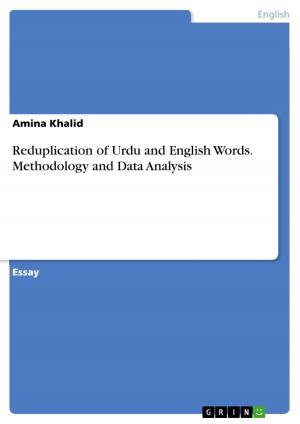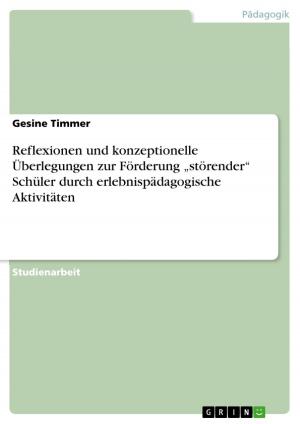Das ? der Kultur - Eine Physiologie des interkulturellen Managements
The ? of Culture - A Physiology of Intercultural Management
Nonfiction, Social & Cultural Studies, Social Science, Anthropology| Author: | Gebhard Deissler | ISBN: | 9783656120711 |
| Publisher: | GRIN Verlag | Publication: | February 6, 2012 |
| Imprint: | GRIN Verlag | Language: | German |
| Author: | Gebhard Deissler |
| ISBN: | 9783656120711 |
| Publisher: | GRIN Verlag |
| Publication: | February 6, 2012 |
| Imprint: | GRIN Verlag |
| Language: | German |
Fachbuch aus dem Jahr 2012 im Fachbereich Kulturwissenschaften - Sonstiges, , Veranstaltung: interkulturelles Management, Sprache: Deutsch, Abstract: On the basis of this holistically-oriented integrative cultural reasoning there is No cultural diversity but rather a perceptual diversity: THERE IS NO CULTURAL DIVERSITY THERE IS, HOWEVER, A DIVERSITY OF THE DEPTH OF PERCEPTION OF EXISTENCE! The experience of diversity arises as a consequence of a lopsided perception that ignores or refuses to perceive the wholeness of existence referred to metaphorically as the cultural complementarity principle of unity and diversity that has an inkling of the integrality and integrity of creation. The cultural spell under which the world presently is appears therefore as a consequence of perception that is a culture consciousness with limited awareness. Culture seen as such is an act of consciousness. And the type of culture consciousness a player has cocreates the cultural reality within and around him. From there one may even infer that culture being an act of consciousness based on perception and awareness it cannot be conceived of apart from the human dimension of consciousness. The cultural discourse that fills libraries and the pockets of culture gurus and the lecture halls of universities alike is based on a culture paradigm that cannot have any permanence and sustainable impact on globalization. If it is not enhanced and complemented it can mislead the whole world as fascism and communism have misled the millions and the masses until they were put in their true context and understood more fully. If culture that some assume holds the place of these worldviews and errors of the past at present is not put in its true context likewise it may have the same impact and destiny as those cultural errors. Therefore the present cultural paradigm imperatively requires the correction and completion of its edifice, which is the purpose of the inquiry. This epistemological perception of culture and cultural diversity does not altogether eclipse the practical value of cultural diversity. The first is helpful in cultural problem solving, the second for evolving. Its dialectics help the world to grow and develop based on the dialectics of diversity. When that causes problems the complementary epistemological perception of culture can be used as a cultural problem solver. So the epistemological and the pragmatic standpoint are the complementary aspects of a culture theory and management practice in accordance with man and his needs. And it does not sacrifice one to the other.
Fachbuch aus dem Jahr 2012 im Fachbereich Kulturwissenschaften - Sonstiges, , Veranstaltung: interkulturelles Management, Sprache: Deutsch, Abstract: On the basis of this holistically-oriented integrative cultural reasoning there is No cultural diversity but rather a perceptual diversity: THERE IS NO CULTURAL DIVERSITY THERE IS, HOWEVER, A DIVERSITY OF THE DEPTH OF PERCEPTION OF EXISTENCE! The experience of diversity arises as a consequence of a lopsided perception that ignores or refuses to perceive the wholeness of existence referred to metaphorically as the cultural complementarity principle of unity and diversity that has an inkling of the integrality and integrity of creation. The cultural spell under which the world presently is appears therefore as a consequence of perception that is a culture consciousness with limited awareness. Culture seen as such is an act of consciousness. And the type of culture consciousness a player has cocreates the cultural reality within and around him. From there one may even infer that culture being an act of consciousness based on perception and awareness it cannot be conceived of apart from the human dimension of consciousness. The cultural discourse that fills libraries and the pockets of culture gurus and the lecture halls of universities alike is based on a culture paradigm that cannot have any permanence and sustainable impact on globalization. If it is not enhanced and complemented it can mislead the whole world as fascism and communism have misled the millions and the masses until they were put in their true context and understood more fully. If culture that some assume holds the place of these worldviews and errors of the past at present is not put in its true context likewise it may have the same impact and destiny as those cultural errors. Therefore the present cultural paradigm imperatively requires the correction and completion of its edifice, which is the purpose of the inquiry. This epistemological perception of culture and cultural diversity does not altogether eclipse the practical value of cultural diversity. The first is helpful in cultural problem solving, the second for evolving. Its dialectics help the world to grow and develop based on the dialectics of diversity. When that causes problems the complementary epistemological perception of culture can be used as a cultural problem solver. So the epistemological and the pragmatic standpoint are the complementary aspects of a culture theory and management practice in accordance with man and his needs. And it does not sacrifice one to the other.















